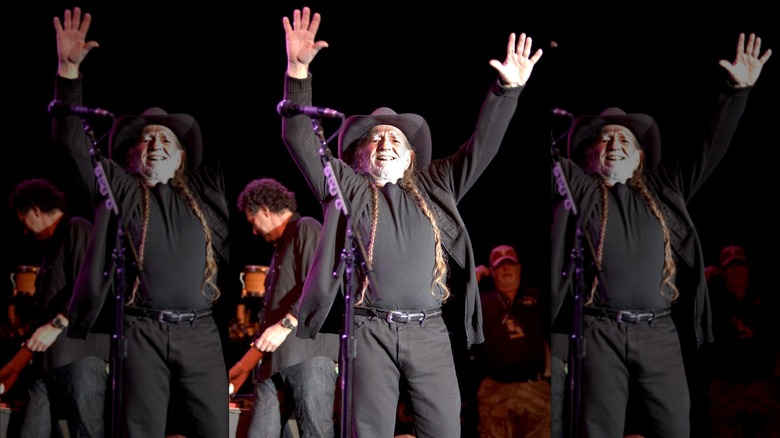Willie Nelson's IRS Struggles, Explained
Even the most successful person can have financial issues that they must deal with. That's what happened to famed country singer/songwriter Willie Nelson. One of the largest tax cases in the country's history occurred when Nelson was slapped with a $32 million bill by the IRS in 1990. This would explain why the legendary musician is worth far less than you would think, coming in at only $25 million. Nelson had been living in Nashville during his career's formative years in the 50s and 60s, but after his second divorce and the tragic burning of his house, he moved to Austin, Texas, where his career thrived and expanded.
Nelson even released an album in January 1992 that boosted his financial woes called "The IRS Tapes: Who Will Buy My Memories." According to the icon's website, the album was not only intended to lessen his debt but also a compilation of various creative processes. It included bloopers, demo songs, and acoustic versions of his track, which he performed with his guitar, Trigger, which he named after Roy Rogers' beloved horse.
Let's take a dive into how Nelson got into legal trouble with the IRS.
Nelson blamed Price Waterhouse for the IRS debacle
Willie Nelson blamed his eye-popping debt to the IRS on poor guidance from his accounting firm, Price Waterhouse, who had set up tax shelters for him, putting him on the IRS' map in 1984. He believed they were working in his best interests, but the feds deemed the shelters invalid and claimed that he still owed $6 million that year, along with the other interest and penalties accrued since 1970, shockingly adding up to $10.2 million.
In November 1990, the IRS confiscated Nelson's properties across six states, as well as his belongings, including clothes, his gold and platinum record albums, equipment, and many of his original tapes. After everything was auctioned off, the government officially charged him with a grand total of $16.7 million. Just prior to the seizures, Nelson sued Price Waterhouse for $45 million, but the firm claimed he had agreed to the tax shelters and they were blameless. That issue has since been settled, but there has been no public reporting of the details.
Nelson stopped touring at the time so his ticket sales couldn't be seized, and he even had the foresight to instruct his daughter, Lana Nelson Fowler, to hide Trigger in Maui so that it couldn't be taken. Texas Monthly reported that Nelson had heard of other performers who had their instruments seized and auctioned off. "As long as I've got my guitar, I'll be fine," he stated.
Nelson's friends stepped in to help him
The IRS found it difficult to sell off Willie Nelson's property and belongings in Texas because the citizens there held him in high esteem. Little by little, he chipped away at the exorbitant debt, and surprisingly, the agency also worked with him to help facilitate payment. That's where the idea for his album, "The IRS Tapes: Who'll Buy My Memories?" came from, and they even helped him promote it.
Regarding collaborating with the IRS, Nelson told Rolling Stone, "Mentally, it was a breeze. They didn't bother me; they didn't come out and confiscate anything other than that first day, and they didn't show up at every gig and demand money. I appreciated that. And we teamed up and put out a record." Fortunately, many fans helped by buying things up and giving or selling them back to him at a later point. He had always championed the Farm Aid music festivals, which helped farmers, and a group of members purchased his Austin ranch.
Also, Darrell Royal, retired football coach for the University of Texas, scooped up Nelson's country club and golf course. In March 1991, he told Tulsa World, "I'm going to sell it back to Willie anytime he wants it. And he wants it bad." Royal and Nelson had been friends for decades, and the fact that so many helped him in his hour of need shows what a beloved icon Willie Nelson truly is.


